U2 (A Journey To The End Of Taste):: The O2, London, November 2 and 3, 2015
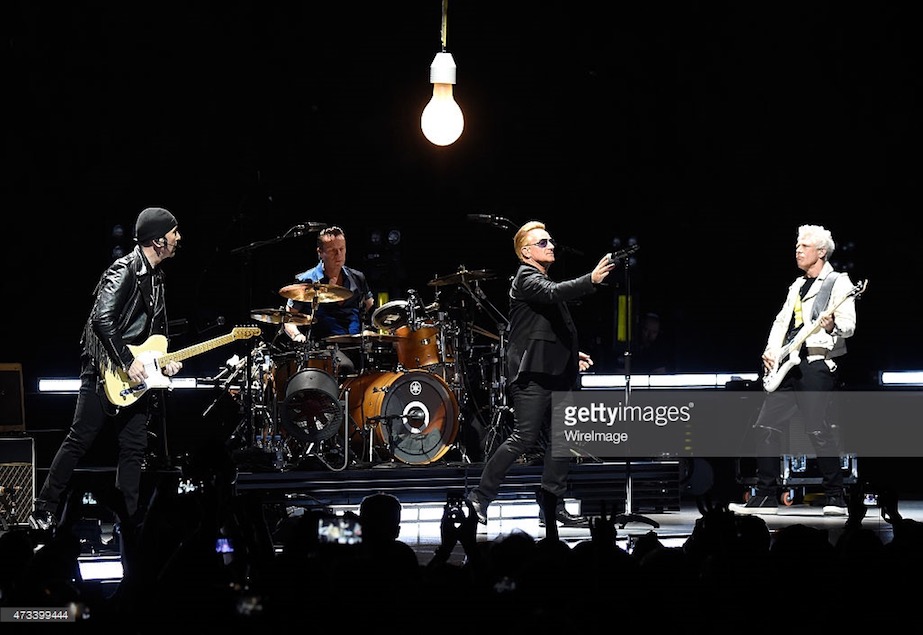
Why do I love music? Is it in my nature, derived genetically from my parents, and going back before that, to my paternal grandfather, who was in a singing group in his teens? Or is it nurture: was I made this way by constant exposure to music from the day I was born? Why do I love Bowie and not Céline Dion? I’ve made judgements about music all my life, and I wonder if I’m getting more argumentative as I get older. My views have become more concrete in terms of my own moral (political, social, feminist, equality-based) certainties, but I do think my likes and dislikes have evolved towards greater open-mindedness, and I certainly know myself in a way I didn’t in my 20s. I suppose we’re all the same. We have passions that we want to share with others and we want others to feel the same love we do, whether about our politics or the art that matters. What I hope to work towards, when it comes to differences of taste, is the ability to restrain myself from feeling negatively about someone who loves/hates something that I hate/love. It’s something I am trying, struggling, to do, to improve myself: to stop being so knee-jerk about oppositional views, which in the current internet age feels nearly impossible some days.
Our parents make us in their image, and we mirror their tastes because they are our first and primary influencers. But at some point, you break away from getting all your opinions from them. Yes, there’s a primal pull for me in judging someone’s music taste, as my mother did. She would question everyone about what they liked and, if their answers didn’t meet her high standards, she would, sometimes in a charming way, sometimes not, rebut them and scoff at what they loved. Once she questioned someone about their favourite band, and when the answer came back as Take That she bit her tongue and asked who this person’s favourite member was? The reply, under pressure and beneath mum’s stern, demanding eye, was that she couldn’t remember their names. This was the final straw; mum was incredulous at such a lack of attention to detail. It wasn’t about liking Take That anymore. It was about the fact that, if you’re going to have a favourite band – even if it’s a shitty one that I hate, she thought – the very least you can do is know their names.
My reactions to the music other people love have often resembled my mother’s: super, ultra, crazily judgemental. Dad is similar, but less wild-eyed about it. Though I did speak to him about this review and he confessed he is still baffled and annoyed by his best friend’s extreme dislike of two artists – Beatles, Hendrix – who most rock fans, which he is, adore without question. I’d like to evolve somehow past all that judgement. Who am I to be passing comment on what I perceive to be a lowbrow taste, a devotion to music I deem of poor quality (writing, performance, production) or sentimental in the worst way? What I should be doing is trying to strip myself of being so argumentative and just be grateful that other people have… loves and hates and passions just like mine (thank you Moz, you have a lyric, if not a novel, for every occasion). I value music and admit I feel sorry for those who think it’s alright, own a few albums, quite like it but could live without it. I barely understand how there are people on earth for whom music is not only unimportant but absent in their lives. I know: how pretentious and condescending is that? If everyone likes what I like as much as I like it, then everyone is the same. And that sounds pretty dull. This all leads me to a book I was recently bought: Carl Wilson’s Let’s Talk About Love: A Journey To The End Of Taste. I actually think this beautiful, insightful, intelligent, even moving book could make me a better person. Perhaps I am this way because I’m a frustrated music critic at heart, because I don’t create. I’m cool with that – it’s a living (pretty much). But my intense need to correct doesn’t just extend to books or magazines or menus, it goes to people as well. I can’t resist telling people what I think of what they think. I’m not immune from being the subject – tying into Wilson’s concepts of the social hierarchies of how we relate to others – as only the other day I was getting into it on Facebook. The subject? U2. Having posted that I was excited about seeing them live, friends immediately rushed to tell me how much of a gigantic twat Bono is (no mention of their music from the Bono-haters). Others told me they loved U2, who put on a great show, etc. (no mention of Bono from the music-lovers). I couldn’t help notice that the haters were those with otherwise ‘cool’ music taste (indie/alternative types), and the ones who loved U2 also loved the Stones or Bon Jovi or other mainstream rock music. I admit that U2 are somewhat of an anomaly in my own music collection. If you were to glance at my iTunes Library you would find tons of classic pop/rock, certainly. But you’re more likely to close your eyes and stick a pin in Albert Ayler or Ornette Coleman or Wayne Shorter or Sufjan or Terry Riley or Joanna Newsom or Laura Nyro or Björk, and so on. What this means is that, certainly as I’ve gotten older, my ears seem to like, and my brain seems to seek out, music that’s sonically diverse and/or unusual. In my teens I was all about three chords and the truth. It was all big rock by white, straight guys: from the Beatles to Guns ‘N Roses to Aerosmith to Led Zep to the Doors (all of whom I still like). In my 20s I expanded that palette a little to the Flaming Lips and Radiohead et al. In my 30s all hell broke loose in my music collection, with old off-kilter discoveries coming by the day (Tom Waits, Kate Bush, Eno, innumerable jazz albums), genre gaps being filled by the truckload (country, Americana, folk, psychedelia, prog, free jazz, krautrock, classical, electronic, ambient, everything!) and suddenly, unexpectedly, a passion for hip-hop (Kendrick, Kanye and getting in with the godfathers like Gil Scott-Heron and the Last Poets, then Public Enemy, De La Soul, A Tribe Called Quest, in short catching up with forty years of rap culture). There are not enough hours in the day to listen to everything I want to listen to.
The Wilson book, which he talks about here in an excellent Pitchfork interview, has been recently reissued and extended with accompanying essays from the book’s admirers, including Krist Novoselic, Nick Hornby, Ann Powers, Owen Pallett and James Franco (my copy is the original). It has become perhaps the most acclaimed title in Bloomsbury’s 33 1/3 imprint, which puts out small-form books, each about one album. I was gripped from page one. It’s about judgement, taste, sentimentality (which he defines as the opposite of cool), love, hate, cultural and social capital, music history, prejudice and more. For a case study, Wilson chose an artist he hated: Céline Dion. His concluding point, in general, is that writing the book made him become more open to opposites, which goes against the way the internet is designed to dominate cultural life. The online experience is based around ‘we know you like this, here’s more just like that’, whether it’s Amazon recommendations or Last.fm libraries or iTunes Genius. These systems are set up to sell you more of the same, which is the opposite of what I want now. I already have hundreds of classic albums. What I want, as I get older, is stuff I’ve never considered before.
Wilson could just have easily chosen U2 over the Québécoise chanteuse. Except his objections would have been based on music versus not-music. What that means is, despite 220 million albums sold, people despise Dion’s music and, despite 170 million albums sold, people despise Bono. They object to her music and his personality. Nobody cares much what kind of person Dion is: they just hate her cheesy, saccharine, shrill and ubiquitous songs, despite only hearing My Heart Will Go On. Nobody cares much what U2 sound like (in fact, most pop/rock fans would admit their music is actually, technically good, with its gargantuan hooks): they just hate Bono’s political pontificating and lecturing. So it came to this: in a confluence of events so deliciously perfect as to defy parody, I was sitting on a little step at a U2 concert reading the Céline book last night.
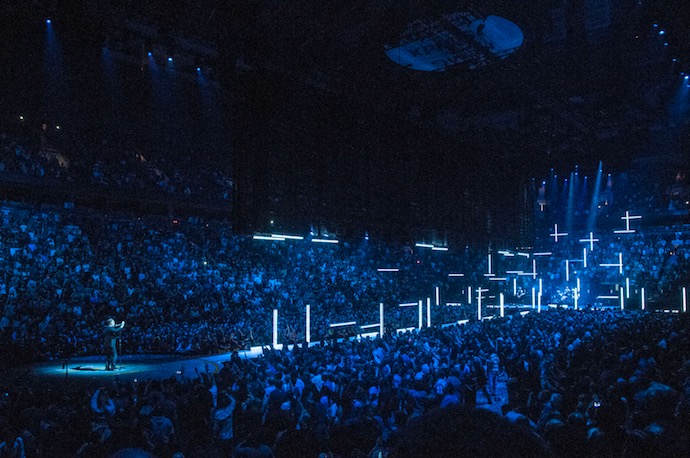
I’m realising this isn’t largely a review of the show, is it? It’s more like a series of musings on why we love what we love. Why does my adoration of uncool U2 persist? It’s not stubbornness; I genuinely think they are one of the great bands. Why do I bat away anyone who can’t wait to tell me how tedious they find the singer? Why do I love him despite this? For a kid from Dublin, who left school with no qualifications, who has for decades worked tirelessly for social justice, learning by doing nothing more than reading mountains of books and talking to people, who can get his calls taken by presidents and prime ministers… he is so hated, because rich pop stars shouldn’t minister to their flocks about the impoverished. He rubs people up the wrong way, despite being pretty much exactly like Springsteen, who never gets shit for doing the same thing – using his stage like a pulpit, preaching about the power of doing good and of rock and roll – and it baffles me. He’s the most hated rock star on earth. I’m trying to get to a place where I let go of my need to defend him, rather than explain why I disagree and drive myself mad trying to change minds. His music makes me happy and I like him, so I know I should stop trying to convince anyone to think like I do. A lesser version happens with Dylan as well, incidentally. How can I like such an awful singer? How can I stand such sins committed on his words, rendered unintelligible? It happens with Morrissey all the time. People can’t stand him, and can’t wait to tell me about it, though to be fair sometimes he doesn’t help himself. Perhaps getting older is accepting that you love what you love and you can’t be persuaded out of it, but the flipside is that you need to let go of the notion that you must convince everyone else why you feel that way. That kind of self-acceptance is a work-in-progress. U2’s forced album download crime, to be fair, didn’t help. You almost have to admire that level of hubris. It’s a great record, after the very flat previous one, so they didn’t need to give it away, but there you go. They took shit and then got on with it. Frankly, if you are dumb enough to trust Apple/iTunes and have switched on automatic downloading you probably deserve to get a U2 album for nothing. Welcome to the era of killed privacy, monitored liberty and big data. U2 are the least of your problems online.
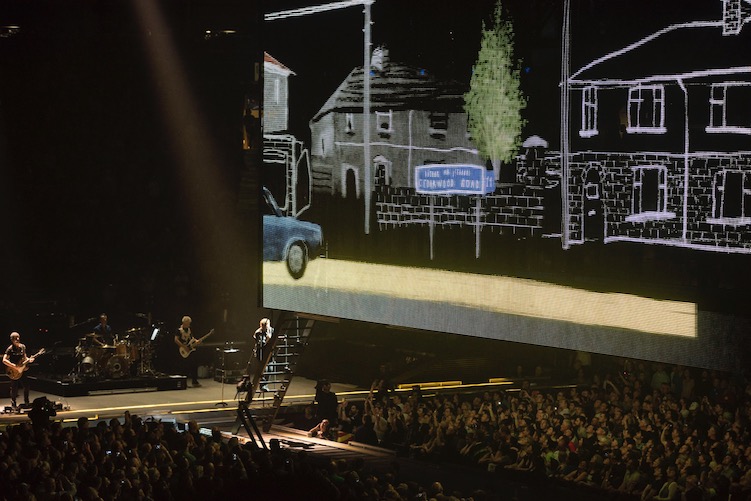
Last time out for the mammoth 2009-11 360° Tour the three huge metal (not glass) spiders would live in three cities at a time. One was being put up, another being taken down and the last was being played under, simultaneously. This time it’s more of a residency venture, with between two and five shows (six in London and eight at Madison Square Garden) being played in each arena, which lets everyone settle in for around a week at a time into each city. In contrast to the largesse of 360, the main stage has few lights, and the first four songs take place under a single oversized light bulb. It must be exhausting putting on these shows but probably less so this time than previous tours: 76 arena gigs on this Innocence + Experience Tour compared to 110 on the last one (all stadiums: the highest grossing and attended tour of all time), 131 on the set before that (2005’s Vertigo, also stadia) and 113 going back to Elevation (arenas) in 2001. Today I feel both elated and knackered, which makes me realise how fit the band must be (at 15/16 years older than me) to do this every night. Let’s also take into account how, frankly, cursed the tour has been, having to be delayed for months because Bono smashed himself up in a bicycle accident, breaking his arm, finger, eye socket and shoulder. The day before the first show Larry’s father died; he flew to Dublin and back in time for the gig. Incidentally, Larry is still ageless and hot as hell (any excuse to post this) and, while I’m at it, Adam has unexpectedly become a silver fox. Edge then fell off the stage at the first show, and thinking about Grohl’s leg-breaking spill, he got lucky to get away with a few scrapes. Then the irreplaceable Dennis Sheehan, their tour manager since 1982, died just after the tour started. Yet still they go on, survivors all, toughness inbuilt.
So, trying to get back on point, we had to go and get our tickets together (security stuff, to try and avoid touting; inflexible but it’s an evolving thing, gig entrance tech) and get our various wristbands affixed. Handed my ticket, I saw that it was £215 – not the 100 he said, nor the 65 I paid. I didn’t say anything but I guess that’s the price of the best side vantage point in the house; before you even think it (that U2 are greedy), the Red Zone ticket money benefits (RED), the AIDS charity. Madonna’s most expensive, to compare, are £300 and, you will already have guessed, do not benefit a charity. I took my place in the little barricaded off section at the side. Last tour, there was a ‘golden circle’ (all big artists do this now: pay more, get to the front ahead of the hoi polloi) but they’ve changed it so fans paying their £65 can get to the front. While entry to the RZ is a touch earlier than GA, so you can go out of your side section and to the centre front if you wish, only a few hundred RZ tickets are sold, which means there’s plenty of room for fans who bought the cheap tickets. All quite nicely arranged, I thought. So I went in and found a seat, of sorts: it was where the security would stand to pull people over the barrier, but also served as a little chair. Minding my own business, reading my Céline book, I was engaged in conversation by three men in their 40s. In a display of irony so acute that their tiny minds would explode if I had suggested it, they started to tease me for reading a book about Céline Dion (i.e. they were at a U2 gig, who nobody thinks are cool). And yet, I bounced up and what did I hurriedly say? That it was not a book entirely about Céline and that I don’t like her music and don't judge me and blah blah. Yes, I felt the need to tell these total strangers that I was not a Dion fan. One of the men called her a bitch, which I thought was a little far. Music criticism aside, she’s never seemed like a bad person: “let them touch those things!” I kind of love her for that slightly unhinged CNN interview where she defends looters. I explained what the book was about and they quietened down; heaven forefend I’d have actually been a Dion fan at a U2 show. At that point they spotted my Montreux Jazz Festival shirt – this seemingly proved that I was a person of taste and worth listening to (we all judge). I bonded with them after that, and it turned out they had rented U2 seven (!) mixing desks for this tour. These were not your average consoles of course, costing £150,000 a pop (no wonder they rented). The show surely cost millions to put on. I then started to look around and realised the levels of hierarchy that surrounded me and the 150 others in the RZ. The real fans, who’d paid that much to get as close as they could, were pressed against the barriers. Everyone else was either rich men (with the stench of banker about them) and their younger girlfriends or people who’d worked on the show. Of the middle category, one couple stood out: both attractive, him about 15 years older than her, and very drunk. She kept bumping into people, all night, with no apology forthcoming. She was of the variety of girls so beautiful, for whom everything in life had gone perfectly, and had never felt a need to be polite or courteous. Imagine what the life of a supermodel-level woman is like… the world belongs to you. It must not even occur to you that other less attractive humans exist. Vapid and rude, she harangued anyone whose face she recognised. This brings me to the most surreal part of the evening.
Each night, during Beautiful Day, the lyrics are changed to say hello to whichever famous friends are in the house. As this is U2, and they know everyone, depending on the city it could be Bill Clinton or Brian Eno. As it happened, on my first night it was indeed Eno (“see the world in green and blue, Brian Eno right in front of you”). Jimmy Page was there too, just for good measure. Slightly to my right was a cordoned off section, fully on view to everyone around it, a foot or so off the ground. I didn’t pay it much mind at first; then it started filling up with faces I knew. There I was, with space to dance and jump around, while Stella McCartney, Chris Martin (and his stunning girlfriend, actress Annabelle Wallis) and, ridiculously, Woody Harrelson did the same embarrassing white-person dancing as me. The Z-list nobodies in my section behaved like drunken assholes. The A-list somebodies were courteous and polite every time they were asked for a selfie. This is something I’ve heard often about Hollywood, incidentally; that the Z-list actors/producers/directors treat people like shit, from the catering guy to the driver, but that Brad Pitt and Tom Cruise and Meryl and everyone at that level are the exact opposite and nobody has a bad word to say about them. In action, I saw it. By the way, Chris Martin took the same amount of pleasure in seeing U2 as me and sang the songs just as loudly as I did.
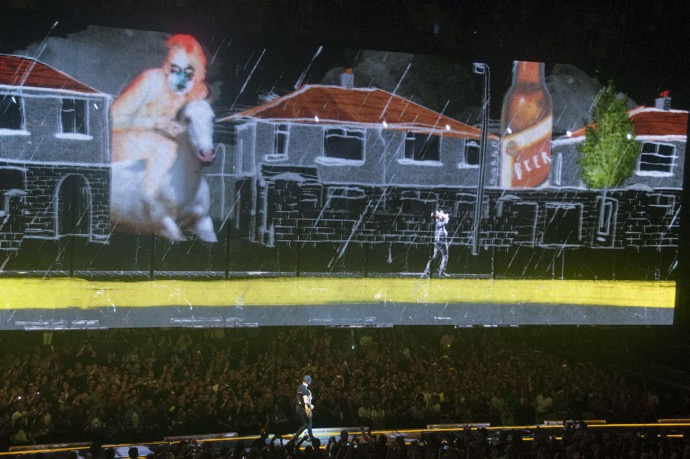
I’ve realised that part of my love of seeing multiple concerts is centred on the differences. I want to see a show twice or more so I can notice the bits that change; this details obsession translates to every aspect of my life. It’s useful, if a bit of a curse, but that’s the way I’m made. Seeing a second show can give a fuller picture and you might even hear different songs. At this high level, there are three elements to setlist design – which itself is a fine art. Songs that must go in (Streets, Pride, With Or Without You, Mysterious Ways, Bullet The Blue Sky, Sunday Bloody Sunday, Beautiful Day), ones from the new album (seven in my first show, six in the second) and then a changeable, smaller, third set, which is made up of older obscurities or forgotten classics. They’ve got a lot of songs to go round. I got five song changes for the second show, which I was pleased with. On night two of the six, incidentally, they had gotten Patti Smith on to sing People Have The Power, which they come on stage to each night, and then, the night after, Noel Gallagher popped up for Still Haven’t Found… and a heartfelt version of All You Need Is Love. I spotted him last night, chatting to a teenage boy as I made my way down the side, behind the section with the famous people in it, to the back to see the B-stage set. At first, I thought, is that his kid? No, he has a daughter that age, not a son. Then I spotted a gorgeous dark-haired woman standing behind the boy, who I realised was Alison Stewart (Hewson), Bono’s wife, and that the lad was probably their youngest. I should have gone up to Noel and asked him if he knew the City-Sevilla score, which would have been a question he couldn’t have bet on being asked, but the moment passed (we won 3-1!). He was later spotted getting as into it as any other fan would, even one who’s known Bono for 20 years, and then having a little dance with Ali. Lest we forget that, like Morrissey, he’s Mancunian-Irish. Ironically, while witnessing all this I managed to miss a little snippet of Young Americans, of all things, in Mysterious Ways. I did catch a little shot of TOTP Starman on screen during the childhood section though, which is no surprise. Last tour they came on to Space Oddity every night. Ending the show, I was particularly thrilled to hear Bad, which caused a joyous explosion of love in the room, followed inevitably by 40. There wasn’t enough time for all the songs they had to leave out either: New Year’s Day, Running To Stand Still, Zoo Station, I Still Haven’t Found What I’m Looking For, All I Want Is You, Angel Of Harlem, Sweetest Thing, Stuck In A Moment, Staring At The Sun, Discotheque, Walk On, The Unforgettable Fire, Sometimes You Can’t Make It On Your Own, plenty more…
So in the end, what am I trying to say about love and music and taste? I can only say what a pleasure the pair of nights were and what a grand time I had. Some people will never get past their Bono(Céline)-aversion and give something they think they hate a chance. I hope that one day I’m able to become someone who embraces what makes other people happy. I hear Céline’s back in Vegas…
Setllists
Night 1
The Miracle (Of Joey Ramone)
Out of Control
Vertigo (Do You Remember Rock' N' Roll Radio/God Save the Queen snippets)
I Will Follow (London Calling snippet)
Iris (Hold Me Close) (snippet of David Essex’s Hold Me Close)
Cedarwood Road
Song for Someone
Sunday Bloody Sunday (When Johnny Comes Marching Home snippet)
Raised by Wolves
Until the End of the World (Love and Peace or Else & Words snippets)
Inside Screen
The Fly (remix, band offstage)
Invisible
Even Better Than the Real Thing
‘E’ Stage
Mysterious Ways (Burning Down the House snippet)
Elevation
Volcano
Every Breaking Wave
October
(back to main stage)
Bullet the Blue Sky (Ode to Joy & 19 snippets)
Zooropa
Where the Streets Have No Name (California (There Is No End to Love) snippet)
Pride (In the Name of Love)
With or Without You
Encore
City of Blinding Lights (Stephen Hawking speech intro)
Beautiful Day
One (with 'Mother and Child Reunion' intro)
Night 2
The Miracle (Of Joey Ramone)
Gloria
Vertigo
I Will Follow
Iris (Hold Me Close)
Cedarwood Road
Song for Someone
Sunday Bloody Sunday (When Johnny Comes Marching Home snippet)
Raised by Wolves
Until the End of the World
Inside Screen
The Fly (remix, band offstage)
Invisible
Even Better Than the Real Thing (Young Americans snippet)
‘E’ Stage
Mysterious Ways (Burning Down the House snippet)
Desire (Love Me Do snippet)
Party Girl
Every Breaking Wave
October
(back to main stage)
Bullet the Blue Sky
Zooropa
Where the Streets Have No Name
Pride (In the Name of Love)
With or Without You (Yellow snippet)
Encore
City of Blinding Lights
Beautiful Day (Live Forever snippet)
Bad (with 'Mother and Child Reunion' intro)
40
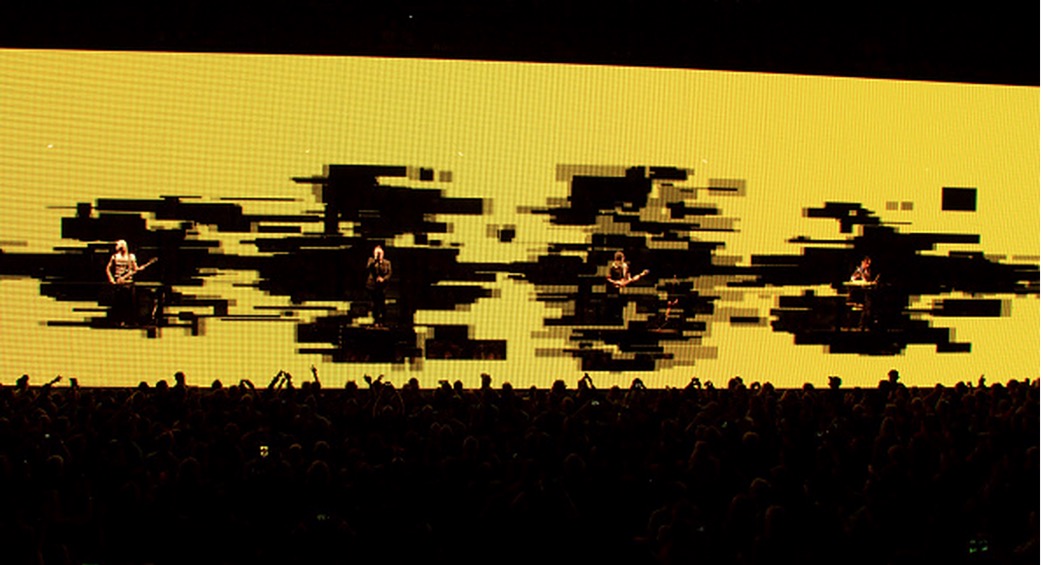
U2, Wembley Stadium, London, 14-08-09
I can’t think of one other established band that would dare start a stadium show with four songs from their new album. A band that has been around for 5 albums wouldn’t be confident enough to do it. A band with 10 or more albums tends to put one or two tracks in, sneaking them in between a couple of famous ones. A band with more than 15 albums, a rock dinosaur like the Stones or The Who, play nothing from the last 30 years of their careers. And yet here we were, in the ludicrous Wembley Stadium, listening to four songs from No Line On The Horizon open the show. I’d bemoaned it, having taken a sneaky peek at a typical setlist already, but I can’t deny that it worked perfectly. People are chomping at the bit to hear songs they know but this band are still making good records and everyone knows it. They drop in perfect pop songs like Beautiful Day and I Still Haven’t Found What I’m Looking For as if these are just one of many. And they are. Songs this band might use as B-sides would sit as the best songs in their imitators’ canons.
It’s just so easy. And they are this good not because they are all great musicians, they got this good simply because they work hard. Because they have been playing live for 30 years and at this level, they know what they’re doing and somehow make Wembley seem small. Part of that is due to the cartoonish ‘Claw’ stage set. A staggering feat of engineering and designed to resemble some kind of space station (well, they did come on stage to Bowie’s Space Oddity). Every inch of this contraption does something – a mirror ball at the top some 65 feet up, endless lights, moving walkways, a mic shaped as a steering wheel on a rope comes down for the encore and, perhaps most jaw dropping, the 360 degree screen wrapping underneath the entire structure. It’s well executed in itself but about an hour in the whole thing expands downwards, in a lattice shape, to almost reach the crowd’s heads. Ironically, this led to the show’s inevitable dip as I found the new version of the screen completely overwhelming and distracting. The spectacle should complement, not cover up, the band. That could also be due to the average City Of Blinding Lights being up next, looking bloodless after the immense Unforgettable Fire.
In the 90s, as they made musical strides that ensured they sold less records, the pinnacle of rock show excess was undoubtedly ZOO TV. Playing almost every track from their then new album, (the now acclaimed as a classic) Achtung, Baby, Bono fully took over and, let’s face it, U2 have never been shy of embracing their inner Spinal Tap. Those who declare them humourless must be watching a different band than the one who dressed as the Village People for Discotheque, indulging in a camp, now dated but still fun, remix for Even Better Than The Real Thing and did a show backed by the biggest screen ever used in a gig while performing under a giant yellow half of a McDonald’s M. It’s easy to paint them as earnest when they insert a sample of an uplifting Desmond Tutu speech before the encore, or ask everyone to wear paper masks of Aung San Suu Kyi - but somehow, even though you know you should groan, you don’t mind. They give you the songs, so what if they ask you to think for 30 seconds a couple of times? There’s no reason why a rock concert has to be completely mindless. Still, I’m glad that they went back to making obvious music in 2000, which competes with, and effortlessly outflanks bands half their age - the balance in the ranks has been restored. It’s not just Bono’s show anymore.
The ageless Larry Mullen, the greying but effortlessly cool Adam Clayton and The Edge, a scientist of a man who fills the stadium with iconic riffs, are no mere supporting players. They’ve never been better. Other bands who try and fill this kind of space – Coldplay, The Killers et al – should stand back. They know they will never be as good; they will never put on a rock spectacle like U2 can. This is how it’s done.
